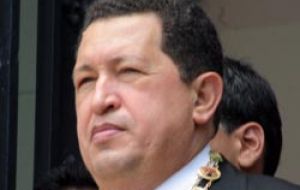MercoPress. South Atlantic News Agency
Chavez set to win Sundays’ legislative election: question is the day after?
 The charismatic Venezuelan leader has no competitors
The charismatic Venezuelan leader has no competitors The Venezuelan opposition is certain to make gains in Sunday’s legislative elections but not enough to wrest legislative control from President Hugo Chavez in the 12th year of his socialist “revolution”.
The critical point will be whether Chavez's party can hold on to a two-thirds majority (110 seats out of 165) needed to pass major legislation. In the past, after election wins, Chavez has used the political capital to step up the pace of nationalizations and socialist reforms.
Equally important the election will be a test in anticipation of 2012 presidential election when Chavez is planning to run again to consolidate the “Bolivarian” revolution. Even when millions of impoverished Venezuelans adore populist Chavez and will follow him the economy is in trouble: recession, inflation, insufficient funds to finance social programs, rampant insecurity and shortage of staples.
However by Venezuela's past volatile standards, campaigning for the National Assembly elections has been peaceful, though there are fears of unrest if either side rejects the results.
The energetic Chavez has been criss-crossing Venezuela to drum up support for his candidates in a vote that is a precursor to the 2012 presidential race.
“The battle goes beyond September 26. Its final objective is 2012, where we will again win the presidency” Chavez, 56, tells supporters during one of his many daily speeches and rallies.
A big victory for Chavez would probably mean a deepening and acceleration of his socialist overhaul of South America's top oil exporter.
But he could also respond to a weak showing on Sunday by driving quick reforms through the National Assembly before new legislators take office.
Chavez's popularity is hovering in the 40-50% range, according to most polls and analysts. That is well below his highs of previous years, but probably enough to ensure his ruling United Socialist Party keeps a majority in parliament.
The Socialists are a couple of percentage points ahead of a newly-united opposition umbrella group, Democratic Unity, polls show. That, combined with changes to voting rules and the electoral map that favour the government, means Chavez's party enters the vote as favourite.
Opposition parties are, however, guaranteed significant gains because they boycotted the last parliamentary vote in 2005.
Democratic Unity candidates believe voter discontent with “Chavez's authoritarian style, one of the world's worst murder rates outside a war zone, a second year of recession and untamed inflation” give them a real shot at winning a majority.
“The people have fallen out of love with Chavez. We're coming back!” said Berta Morales, a veteran activist with Democratic Action, one of the parties in the opposition group.
The opposition may run Chavez close on the overall popular vote, giving it a symbolic boost ahead of 2012, although analysts believe his allies will keep control of the legislature.
High on Chavez's agenda are further reforms to local government, to take power from central bodies and put it in hands of grass-roots structures largely loyal to him. There may be further government takeovers, too, in the food and financial sectors.
Wall Street analysts are divided on the vote's impact on Venezuelan bonds. Some say opposition gains could boost prices by pointing to a beginning of the end for Chavez, while others say that could spell instability and would weigh on bonds.




Top Comments
Disclaimer & comment rulesCommenting for this story is now closed.
If you have a Facebook account, become a fan and comment on our Facebook Page!